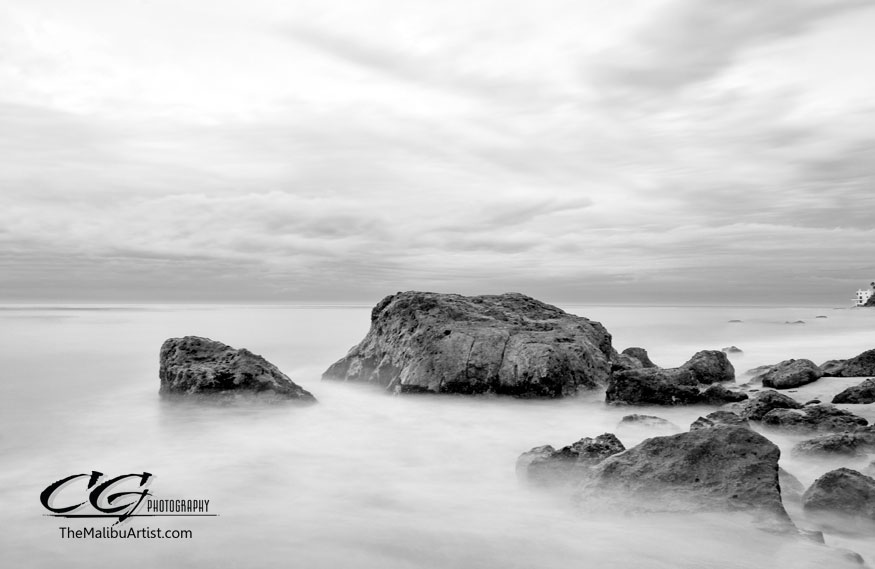With Digital photography, B&W photography has really become more of a post-processing technique rather than a "straght out of the camera" method used in B&W film days. As I've mentioned before, even if I plan a photograph to be black and white as a final product, I still shoot every single photograph in color with the idea that I will make the right contrast and tone adjustments in Photoshop. I do beleive this has become the norm in the industry.
I currently use Photoshop for nearly all my B&W conversions in post processing. Having used Photoshop since the early Photoshop 4 days, I've become well versed in some of the more advanced aspects of the program. But it's the simplest use of Photoshop that is most fun to use.
Converting a color image to B&W is one of those simple things I do in Photoshop everyday. The process behind it is much more than a simple conversion however. It's in post processing that B&W photography can really become fun. Photoshop gives you tools to edit, enhance, or remove contrast and tones. Despite this, remember, it's always more simple if you've done the job right using the camera first. Your workflow, in general, will be much easier if you've created the conditions prior to post production that allow you to simply convert to B&W without the tedious editing.
Below are three images of the same scene I recently shot. The first is obviously the color version, but the second and third images are both black and white using different post processing steps. There is a difference between the 2nd B&W image and the 3rd B&W image.
 |
| This version has simply been Desaturated in Photoshop. |
 |
| This version is a little more advanced, but the result is a "true" B&W image without the grey tones. Only Black and White. |
So for those who use Photoshop, here are the recipes for B&W conversion technique shown above, both of which I use. One is the most basic way to turn an image B&W, the other a more advanced "true" way to make an image black and white (I will explain).
------------------------------------------------
Method 1: Desaturate
This is Photoshop's basic Desaturation command. One that is the most basic of Photoshop commands. All it does is remove all the color tones from the image, leaving you a B&W image with varying black and grey tones. Although it looks B&W, the grey tones in the image technically don't leave you with a true B&W image. Regardless, it's still the most used method in Photoshop to create the black and white effect and I do still use it on occasion.
Here's how you do it.
In the menu select the following (screenshot below).
Image>Adjustments>Desaturate or you can just use the keyboard shortcut Shift+Ctrl+U.
 |
| Shift-Ctrl-U is the shortcut for Desaturate |
That's it! It's super simple.
------------------------------------------------
Method #2: True B&W via Channel Removal
This is what I normally use. Granted it takes a little longer to do initially, you can make it take the same amount of time as the Desaturate command by simply creating an "action" in PS and assigning that action a keyboard shortcut. Personally, I've used this action I created thousands of times by just pushing F5 on my keyboard (of course, if you don't like F5 you can set it to any other key or combination).
The concept behind this is removing the tones found in the channels of the RGB data of the image. To do this you have to remove Channel A and Channel B from the image. Yes, this is a little more technical, but it's the way to get a true B&W.
Step one: Convert image from RGB to Lab Color (see below) in Image Mode.
 |
| Step 1: Convert from RGB to Lab Color |
Step two: Go to Channels (next to Layers) and delete A and B Channels.
 |
| Step 2: Delete the A and B channels. Drag the channels to the trash can (shown by the arrow). |
Step 3: Greyscale the image. Go back to Image Mode and select Greyscale this time.
Step 4: Convert the Image back to RGB in the Image Mode once again.
 |
| Step 4: Convert the image mode back to RGB Color. |
And there it is. A true Black and White image. Feel free to email me any questions or suggestions for future discussions on Photography and Photoshop as well. I would like to answer any questions in future blogs. I still have to go into my personal tips for B&W photography...until next time! -cg



No comments:
Post a Comment